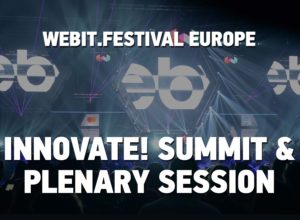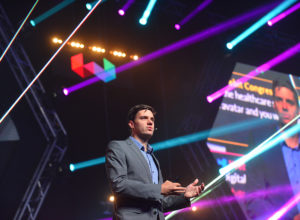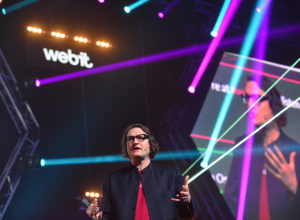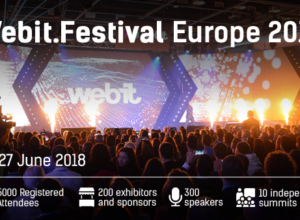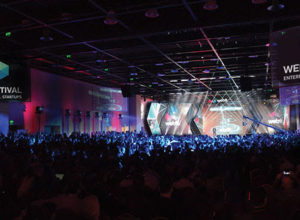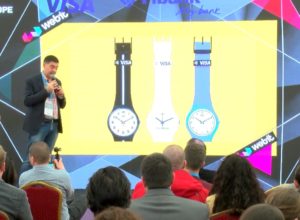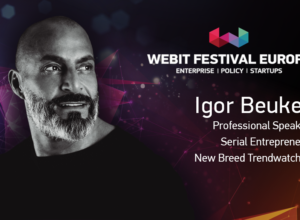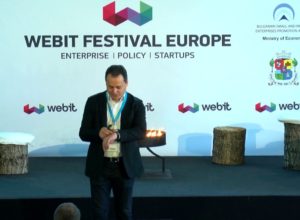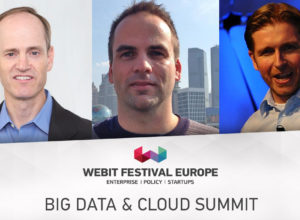Tag: Enterprise
For Innovate, press 5
If you look just 10 years back...
you can easily see the rapid evolution of digital industry. Everything is smart - phones, watches, we even have home AI assistants so that our homes can be smart. At this point we cannot and we don’t want to imagine the world without the technological advantages. More or less, this is normal: for the century we live in, for our jobs, for our life nowadays. So 10 years in our century is a period in which A LOT can change. Just a few months ago Webit celebrated its 10-year anniversary. The festival grew rapidly to become one of Europe’s (and even world’s) largest forums for innovation, technology, entrepreneurship, policy and startups. /You can watch the trailer here: https://youtu.be/695bBvsv6vQ/ Webit.Festival gathers tech, digital and policy elite to re-invent and pave the digital future of Europe.This year is no exception.
We would like to introduce you to some of our confirmed 2019 speakers. So in the next few weeks we will share some interesting information about the amazing line up that we are preparing for this year’s Festival.Today we’d like you to meet 5 Innovation Gurus:
On the Innovate Stage you will see: Dr. Goertzel is one of the world’s foremost experts in Artificial General Intelligence. (It is a subfield of AI oriented toward creating thinking machines with general cognitive capability at the human level and beyond.) Ben also has decades of expertise applying AI to practical problems in areas ranging from natural language processing and data mining to robotics, video gaming, national security and bioinformatics. He has published 20 scientific books and 140+ scientific research papers. He is also the main architect and designer of the OpenCog system and associated design for human-level general intelligence.
Dr. Goertzel is one of the world’s foremost experts in Artificial General Intelligence. (It is a subfield of AI oriented toward creating thinking machines with general cognitive capability at the human level and beyond.) Ben also has decades of expertise applying AI to practical problems in areas ranging from natural language processing and data mining to robotics, video gaming, national security and bioinformatics. He has published 20 scientific books and 140+ scientific research papers. He is also the main architect and designer of the OpenCog system and associated design for human-level general intelligence.
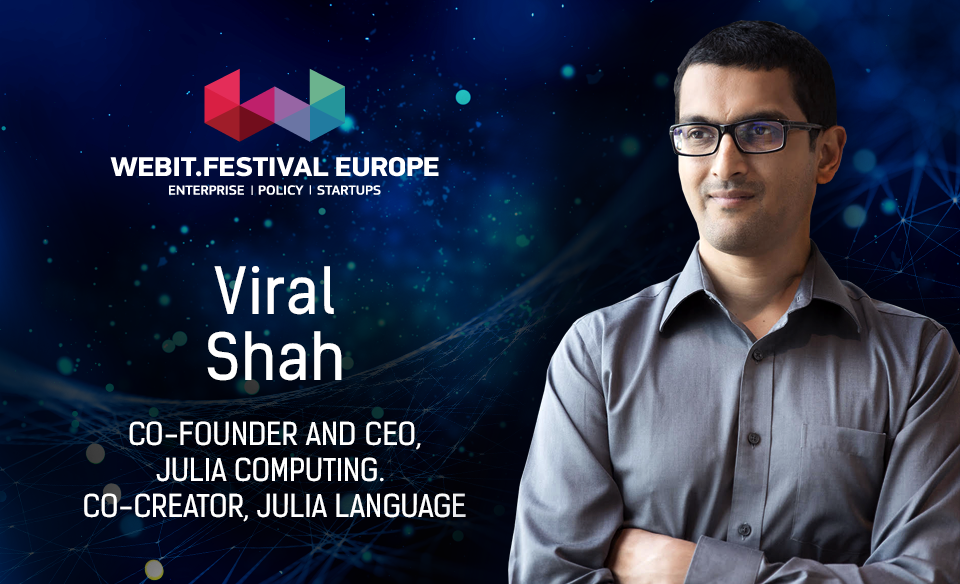 Dr. Viral Shah is CEO of Julia Computing, co-creator of the Julia programming language and winner of the 2019 James H. Wilkinson Prize for Numerical Software.
He implemented a risk management system for derivatives trading on the National Stock Exchange in India.
Viral co-authored Rebooting India with Nandan Nilekan. He is also co-founder of Infosys and founding chairman of the Unique Identification Authority of India, which has delivered unique bio-metric identification to 1.2 billion Indians in the past decade. Rebooting India describes Nandan and Viral's experience implementing a large-scale technology project in government. Viral and his co-creators started Julia as a hobby but it is now their full time occupation at Julia Computing.
Julia is the fastest dynamic programming language for numeric and scientific computing, including artificial intelligence and machine learning. Julia is free and open source and is used by more than 10,000 enterprises and 1,500 universities with over 2 million downloads, 1,900+ packages and 800+ open source contributors.
Dr. Viral Shah is CEO of Julia Computing, co-creator of the Julia programming language and winner of the 2019 James H. Wilkinson Prize for Numerical Software.
He implemented a risk management system for derivatives trading on the National Stock Exchange in India.
Viral co-authored Rebooting India with Nandan Nilekan. He is also co-founder of Infosys and founding chairman of the Unique Identification Authority of India, which has delivered unique bio-metric identification to 1.2 billion Indians in the past decade. Rebooting India describes Nandan and Viral's experience implementing a large-scale technology project in government. Viral and his co-creators started Julia as a hobby but it is now their full time occupation at Julia Computing.
Julia is the fastest dynamic programming language for numeric and scientific computing, including artificial intelligence and machine learning. Julia is free and open source and is used by more than 10,000 enterprises and 1,500 universities with over 2 million downloads, 1,900+ packages and 800+ open source contributors.
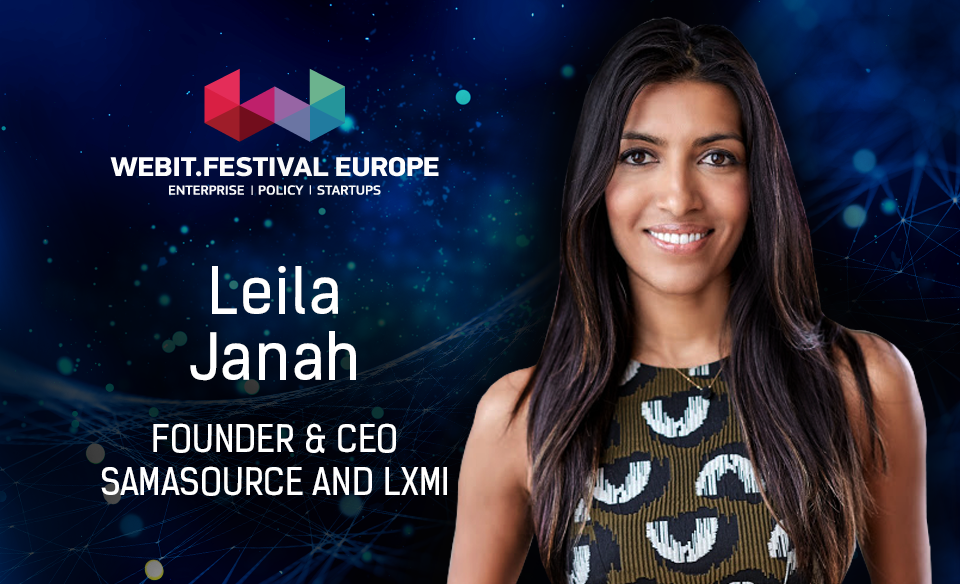 Leila Janah is the Founder and CEO of Samasource and LXMI, two companies that go beyond charity to #givework to low-income people around the world using cutting-edge social enterprise models in technology and luxury skincare, respectively. She is the author of the book Give Work (Penguin/RandomHouse).
Leila is a Young Global Leader of the World Economic Forum, a former Director of CARE USA, a TechFellow, recipient of the inaugural Club de Madrid Young Leadership Award, and also the youngest person to win a Heinz Award in 2014. She is one of Fortune’s Most Promising Entrepreneurs. And she was the subject of cover stories in Entrepreneur, Fast Company, and Conscious Company Magazines.
Leila Janah is the Founder and CEO of Samasource and LXMI, two companies that go beyond charity to #givework to low-income people around the world using cutting-edge social enterprise models in technology and luxury skincare, respectively. She is the author of the book Give Work (Penguin/RandomHouse).
Leila is a Young Global Leader of the World Economic Forum, a former Director of CARE USA, a TechFellow, recipient of the inaugural Club de Madrid Young Leadership Award, and also the youngest person to win a Heinz Award in 2014. She is one of Fortune’s Most Promising Entrepreneurs. And she was the subject of cover stories in Entrepreneur, Fast Company, and Conscious Company Magazines.
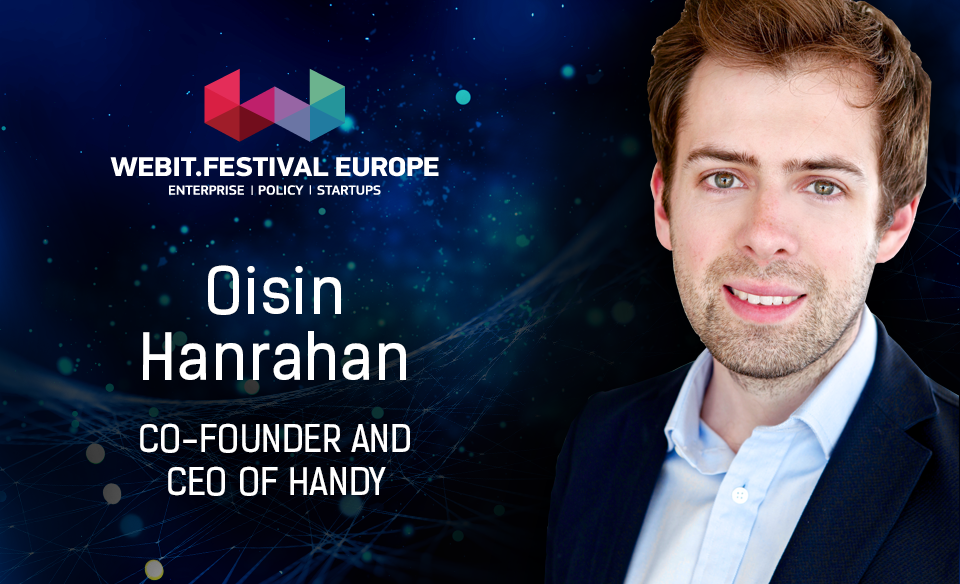 Oisin Hanrahan is a serial entrepreneur with deep knowledge of two-sided marketplaces and a keen interest in technology and politics. Oisin is currently the co-founder and CEO of Handy which he founded in 2012. Handy is changing the way that people book and provide home services. From home cleaning to TV mounting, smart home setup to furniture assembly, people turn to Handy for a seamless, fast and top-quality experience that provides them with access to the home services they need.
Oisin also advises and invests in startups, particularly in New York City. Major media extensively featured Oisin’s work, including CNBC, The Wall Street Journal, and The New York Times.
Oisin Hanrahan is a serial entrepreneur with deep knowledge of two-sided marketplaces and a keen interest in technology and politics. Oisin is currently the co-founder and CEO of Handy which he founded in 2012. Handy is changing the way that people book and provide home services. From home cleaning to TV mounting, smart home setup to furniture assembly, people turn to Handy for a seamless, fast and top-quality experience that provides them with access to the home services they need.
Oisin also advises and invests in startups, particularly in New York City. Major media extensively featured Oisin’s work, including CNBC, The Wall Street Journal, and The New York Times.
And last but not least, a dear Webit friend -
 Martin Wezowski, has been loving and living design and tech his whole career.
As Chief Designer for SAP's Innovation Center Network & Chief Innovation Office he crafts future outlooks, strategies and products, defines and runs innovation frameworks to find out what’s next for SAP and the future of work. He frequently shares his passion for the future of technology and design (TEDx, SXSW, CES, Ada Lovelace, CeBIT, MOBx, Grace Hopper, SIME, MLOVE etc.).
He builds on his international adventures stretching from Poland, Sweden, China to Germany and across companies like SAP, Sony and Huawei, working with consumer electronics, media services and business software.
Martin Wezowski, has been loving and living design and tech his whole career.
As Chief Designer for SAP's Innovation Center Network & Chief Innovation Office he crafts future outlooks, strategies and products, defines and runs innovation frameworks to find out what’s next for SAP and the future of work. He frequently shares his passion for the future of technology and design (TEDx, SXSW, CES, Ada Lovelace, CeBIT, MOBx, Grace Hopper, SIME, MLOVE etc.).
He builds on his international adventures stretching from Poland, Sweden, China to Germany and across companies like SAP, Sony and Huawei, working with consumer electronics, media services and business software.
Тake advantage of the special Early bird prices and book your ticket for Webit.Festival Europe 2019 for as low as 100 EUR!
Will the blockchain industry change digital advertising?
Hristo Hristov is the CEO of NetInfo and Official Representative and Chairman of IAB. He joined Webit.Festival Europe 2018 to share some insights on the future of Blockchain in digital media and advertising.
The crypto market exploded over the last three years. A lot of industries started looking at blockchain as a technology, as to whether it can solve some of their biggest challenges.
Missed the 2018 edition of Webit.Festival Europe? Don’t miss the 2019! Get your super early bird 2in1 tickets – 2 for the price of 1 here!
The crypto market exploded over the last three years. A lot of industries started looking at blockchain as a technology, as to whether it can solve some of their biggest challenges.
Let's look at blockchain:
Blockchain as a technology is still at its infancy. We're still at the hype cycle and blockchain is sitting right next to autonomous vehicles which I don't see happening in the next two or three years and Event-triggered marketing. So as a technology, blockchain might grow into something big like the internet or even bigger, but it might also fade away into some narrow use cases.How can Blockchain improve the Digital Media and advertising landscape?
There are some use cases which are rather obvious: * Fraud detection and prevention * User Identity * Buying and selling inventory, etcCentralization vs. Decentralization
Trust a third party or to use a decentralized approach?Decentralization PROs
* Durability, reliability and longevity - Due to the decentralized networks, blockchain does not have a central point of failure and is better able to withstand malicious attacks. * Process integrity - Users can trust that transactions will be executed exactly as the protocol commands removing the need for a trusted third party. * High quality data - Blockchain data is complete, consistent, timely, accurate and widely available. * Transparency and immutability - Changes to public blockchain are publicly viewable by all parties creating transparency. All transactions are immutable, which means they cannot be altered or deleted.Decentralization CONs
* Trusted 3rd parties - it's not Central vs Decentralized. The advertising ecosystem is based on trusted third parties. These 3rd parties are innovation drivers. * It's too slow - Digital advertising is real-time. RTB standard requires service response in 100ms.There are several examples which already use blockchain in addressing some of digital advertising's biggest challenges.
adChain tries to create a token curated registry of publishers in order to verify and simplify the buying. And papyrus is a decentralized programmatic value management platform aimed to radically improve programmatic advertising stack. All of these solutions are in the making, they are not really ready but they are evolving pretty fast. Several years ago we were talking about mobile apps, then AI, now blockchain. The hype cycles of few years ago were longer and we used to have more time to adapt to them. But now they are becoming shorter and they’re starting to overlap. It wasn’t long long ago that we were talking about programmatic buying. Now it is programmatic buying on a decentralized exchange powered by blockchain.Missed the 2018 edition of Webit.Festival Europe? Don’t miss the 2019! Get your super early bird 2in1 tickets – 2 for the price of 1 here!
Rob Wolcott on “Innovating your life” at Webit.Festival Europe 2018
Robert C. Wolcott is a long time friend of Webit.Festival. He is a Clinical professor of Innovation & Entrepreneurship at the Kellogg School of Management, Northwestern University and Managing Partner at Clareo.
Mr. Wolcott returned to Sofia once again for the 10th anniversary edition of the Festival and wowed the audience with his keynote with special topic "Innovating your life". He started with a quote from the one and only Steve Jobs:
The scientists did their experiment and when it failed, they couldn't figure out why. They changed the method, tried again, then other scientists tried again but it kept failing and nobody could figure out why. Then came Einstein who said: "Perhaps there's no problem with the experiment, perhaps there's a problem with the way we see the Universe." So when something doesn't go the way you expect it, you should step back and do an after action review: Why that did not work? What can we learn from it?
Missed the 2018 edition of Webit.Festival Europe? Don’t miss the 2019! Get your super early bird 2in1 tickets – 2 for the price of 1 here!
The human experience will change more in the next century than it has in the last ten millennia: Where is the discussion to accompany that change?
Mr. Wolcott returned to Sofia once again for the 10th anniversary edition of the Festival and wowed the audience with his keynote with special topic "Innovating your life". He started with a quote from the one and only Steve Jobs:
If your aspiration is to be a leader, to make mark, to create a legacy in some way than it's going to require doing something different. If you don't you're doing the same thing that everybody else already did. And how would that distinguish you? In Robert's opinion over the next 100 years the human experience will change more than it has in the past 10 000! We will be able to solve challenges that have been intractable for centuries but we will also create threads, some of which humanity has never seen before. But unfortunately our public dialog just isn't up to the task. On the one hand we hear ''The robots will steal our jobs and then kill us all in some kind of impending robot apocalypse". But on the other some people are espousing a coming technology infused nirvana. Clearly the truth is somewhere in the vast between and it's our responsibility to explore it for ourselves. The professor broke down the immense and complicated process of "innovating our life" in 5 simple steps:
"Innovation distinguishes the leaders from the followers."
1. Always keep the mission in mind. What are you doing and how are you doing it?
When we stay focused on our dreams and give them new names like GOALS of MISSIONS they automatically become more realistic and more achievable.2. Ask better questions. We only see the things which we are looking for.
We start asking questions, we start looking for new things, for new clues. Clues that will help us get to the next step, but some of them will inevitably mislead us and we will make mistakes. Then comes the next lesson.3. Seek wisdom in mistakes. The very first reaction when something goes wrong is that we are trying to hide it.
The problem is when something doesn't go the way you expect it perhaps there's a problem with the way you see the world. Back in the late 19th century two researchers named Michelson and Morley did one of the most famous failed experiment in history. They were attempting to prove the existence of the "luminiferous aether". It was the dominant hypothesis of physics in the 19th century to explain the following phenomenon.Sound cannot travel through a vacuum because there's nothing for sound to travel through. Light however, can travel through a vacuum thus there must be something in the vacuum we cannot see.
The scientists did their experiment and when it failed, they couldn't figure out why. They changed the method, tried again, then other scientists tried again but it kept failing and nobody could figure out why. Then came Einstein who said: "Perhaps there's no problem with the experiment, perhaps there's a problem with the way we see the Universe." So when something doesn't go the way you expect it, you should step back and do an after action review: Why that did not work? What can we learn from it?
4. Create option paths. Yes, options come at a cost, but create some.
"As we each create our own paths, we together create the future." - says Mr. Wolcott - and he also adds the question to the public - "On which paths are you … and why?"5. Above all seek meaning. Human beings grow through challenges.
The question for each of us is, as lifespans increase up to even beyond a 100 years, as we encounter the remainder of 21st century, we will all be faced with the question: how should we use this time?"Missed the 2018 edition of Webit.Festival Europe? Don’t miss the 2019! Get your super early bird 2in1 tickets – 2 for the price of 1 here!
Chairman of Huawei joins Webit.Festival 2018!
More global leaders join Webit.Festival Europe 2018!
With over 75% senior attendance among the 6000 people audience from 110 countries - the speakers can only be global leaders and shapers! Join Webit.Festival Europe to meet with them, including Mr. Liang Hua, the newly elected Chairman of Huawei - the world-leading telecommunications provider, just over $90 billion in global annual sales in 2017, Huawei is also the world’s third largest smartphone seller.STILL NOT TOO LATE!
Join the Festival and explore unparalleled business networking
A warm welcome to Thibaut Gregoire, General Counsel, Europe, MasterCard, who joins along with his colleagues - both Vice-Presidents - Mikael Svensson and Louise Holden after the President of Mastercard Europe Javier Perez already joined Webit. Presenting you some of the newly announced speakers of the upcoming Europe's tech, digital economy and policy event for 2018 - Webit.Festival!
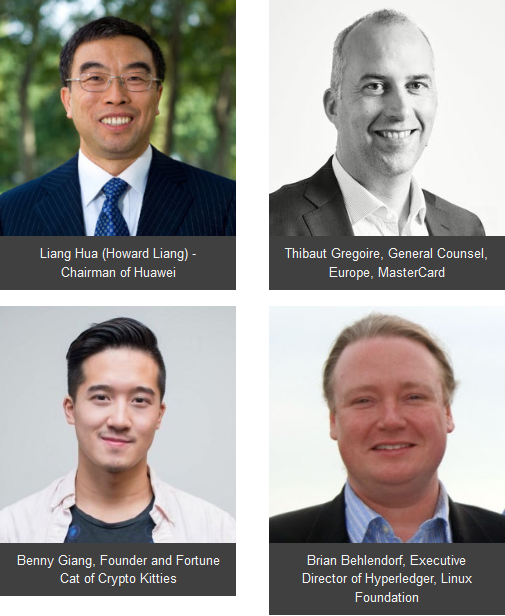 The Blockchain world joins Webit to challenge the future of the decentralized economy! Webit.Festival is the place to involve policy makers, all major tech companies and the blockchain ecosystem to innovate through collaboration!
The Blockchain world joins Webit to challenge the future of the decentralized economy! Webit.Festival is the place to involve policy makers, all major tech companies and the blockchain ecosystem to innovate through collaboration!
 With over 200 exhibitors and sponsors the 10th Webit.Festival is the largest ever European edition, double in size compared to last year.
A warm welcome to Huawei, Red Bull, Google, Amatas, Cogni, Jelurida among the newly joined sponsors and exhibitors of Webit.Fetsival 2018.
With over 200 exhibitors and sponsors the 10th Webit.Festival is the largest ever European edition, double in size compared to last year.
A warm welcome to Huawei, Red Bull, Google, Amatas, Cogni, Jelurida among the newly joined sponsors and exhibitors of Webit.Fetsival 2018.
Interested in exhibiting / sponsoring? Contact us asap!
See you on 26-27 June in Sofia! The Webit Team
Only today! 50% off from all tickets for Webit.Festival Europe 2018!
Only today (29 May) you can join Europe's tech and digital policy event for 2018 and have access to 10+ independent summits and 50+ meetups with 1 ticket at half price!
Webit is welcoming this new era of data privacy by providing all our subscribers a special "DATA present” - 50% off from all tickets for Webit.Festival Europe 2018 only today - 29 May.
Register here and get your ticket
to join Prime Ministers, EU Commissioners and EU top policy makers, global innovators and enterprise executives, Ministers, Mayors, investors, media and Europe's top 200 startups and scaleups - all at Webit.Festival Europe with a special discount of 50% on all tickets with code: GDPR 6000 global experts (67% senior attendance) join Webit from 110 countries.Check who is speaking
Over 200 exhibitors and sponsors join Webit this year. A warm welcome to the group of new partners who join Webit including Microsoft, SAP, Samsung, Fox, Novartis, VISA, UBB, part of KBC Group, Superhosting . BG, VMware, FOX, Turner, Novartis, Bayer, Amgen, Generali to name a few. Special thanks to our General partner MasterCard and our strategic media partners Nova TV and NetInfo.Happy to help.
Should you want to join as exhibitor and sponsor - please contact us.The transforming world of payments
Visa is not the first credit card!
Maybe it’s no news for you, but for the majority of the audience of the Red Stage at Webit Festival, it certainly was. The one who made that revelation is the General Manager of Visa for Israel, Mr. Oded Salomy. He had a keynote at last year’s edition on enabling the transforming world of payments. Visa is one of the names that probably need no introduction. “Visa” has become a nickname for our payment cards. So much, that people tend to there’s much more behind it than just a plastic for payments. Payments is such a vast area that it’s quite unpredictable what the future will bring. We never know what’s going to impact payments and the booming fintech industry. Everyday payments, business to business payments, business to customer payments and reverse.. Machines paying other machines rather than humans, biometrics being used in order to identify people by their biological characteristics.. All the way up to crypto currencies and tokens. New services, easier to work with and keeping a proper security level are needed by this ever evolving system. Numerous startups have been trying to be the next “big thing” that will shake the world of payments as the price of Bitcoin did some time ago.In the Internet of Things space things have been connecting to Fintech too
Wearables such as rings, bracelets, wrist-watches and keychains are becoming more than just accessories - there are already ones out in sale that can allow us to pay on the move. Another category that’s being impacted is the connected cars. With just an Internet connection we can pay for grocery, for gas, parking, insurance while going to work or some more without the need to get out of the vehicle. And last but not least, check the Webit.Festival website for upcoming speakers and our ticket options.Webit.Festival Europe 2018 presents: Igor Beuker
Advertising may win quarters, innovation wins decades
He is a new breed trendwatcher, energetic professional communicator, serial entrepreneur, award-winning marketing strategist and this will be his 4th Webit event - three times in Sofia and once in Istanbul, Igor Beuker has lots to share about his Webit experience.“ Amazing conference, very well-organized, fantastic setting and backstage program, great speaker line-up, and very important to me as a professional public speaker and human being: the connection with the audience (at the event and on social media) is rare and heartwarming. “
Igor is among those speakers who have a special connection with their audience. Here is what he says about the audience in Sofia, and to his fans, in particular:“ The connection with the audience in Sofia, is really one of a kind. I can’t explain the feeling.It’s one of the reasons why - out of 150 international talks each year - Webit is one of the highlights I really look forward to ”
We cannot deny that the difference between Sofia and Istanbul is enormous. Here is what Igor says about his experience:
“ Istanbul is a huge international city and the conference is a bit more business focused and formal than in Sofia, was my experience. I love the culture and the passion of the people in Turkey, and some of the attendees became business partners and friends.”
Bulgaria and Sofia are aiming at becoming a digital hub for CEE and the attitude and approach towards this is a bit more casual. In the same time, however, we coordinate with the government and local authorities, and as from last year, we were incredibly proud to announce that Webit is the flagship event of the Presidency of the Council of the European Union. The EU Commissioner for Digital Economy and Society Mariya Gabriel is chairing Webit's Plenary Sessions and is a patron of Webit.Festival along with The Government of Bulgaria and the Mayor of Sofia.” Last year I shared the stage and the dining table with the president of Bulgaria and the Mayor of Sofia, which is a great opportunity to share ideas.”“Burning Man meet TED” and “Math Man in a world of Mad Men”...
...are just a couple of the new terms that were invented by the Bulgarian audience. At this year’s Webit.Festival Europe edition in Sofia, Igor will further develop his Mad Men vs. Math Men theory."Can I stretch my Mad Men vs. Math Men theory and framework even further? The Webit audience will give me the answer with their reviews and social feedback. My team and me value what they say and I even reinvent my speeches and one-liners for my talks, based upon what they highlight. That legacy brands and incumbents need to get out of their comfort zones, because that’s where the magic really happens. My bold style and personality I can’t change at 47, but the audience feels I know my why and I keep walking towards my purpose. Next-level change and reinvention is needed. Big is only good when big is smart: Advertising may win quarters, innovation wins decades.”
Igor is loved by the companies, adored by his fans and audience everywhere he goes and also by the media.
He gave a very special, exclusive, interview for a Bulgarian media. You can watch his interviews here, where he elaborates his Mad Men vs. Math Men theory in a more simple way. Igor’s answer to “how would you describe the atmosphere at Webit, he says: “Hard to describe, but when I look at the audience tweetback on my site, I get a huge smile on my face and I can’t wait to be back!”We can’t wait to welcome you again, Igor! You have a very special place in our city and our hearts.
“ Experiencing the last three years, I expect Webit 2018 to be even bigger and better than the previous editions. If that is even possible.”
Sure it is! You don’t believe us? Take a look at the amazing speakers line here and the one of the kind networking opportunities here. You wish to attend? Book your ticket here.Central & Eastern Europe risk-capital ecosystem on the world’s map
Webit.Festival - a place for minds to meet. Marius Ghenea, the Investment Director of 3TS Capital gave a keynote at last year’s edition about seizing opportunities and avoiding pitfalls in the fast-growing Central & Eastern Europe risk-capital ecosystem.
3TS Capital has been investing in countries in the CEE region for quite some time and Marius, as a serial entrepreneur and angel investor himself has gained deep insight on the specifics of this market.
Though being quite underestimated in the years back in time, CEE is slowly but surely getting its footprint in business, tech and innovations. The region has drawn attention not only with unicorns such as Skype, Avast, Transferwise and AeroMobil but also with the emergence of multiple, active and growing startup ecosystems across and around.
CEE sure has its historical, economical and national challenges to overcome
The diversity of this region consists of countries in the EU, countries yet to join the EU, countries with an “on the way” developed startup ecosystem and ones that have yet to work towards the achievement of it. This calls for quite a turbulent, hard to define business environment with ounces of political, ethical and cultural differences ranging for each country. Despite the tiny late development, things are starting to look more and more promising. The IT sector has been rapidly growing, adding to a growing GDP for some of the countries. In the last years, we have seen business association networks popping up in the region. One of the things happening more often now is that a growing number of these national and regional associations have been connecting with large organizations and business angel associations on a European and worldwide level. Webit.Festival gathers exactly the people, entrepreneurs and investors involved in this ecosystem mixed with players in the worldwide scene to create a colorful mix. Check our website for more details of the 2018 upcoming edition.Webit.Festival will show you how Big Data and Cloud Services are...
We are standing at the start of a giant transformation, that will change every business and aspect of our lives. In the past two years the world has created more data than in the entire previous history of human race.
According to EMC study, the data volumes are growing so fast, that by the end of 2020 we will create 1.7 megabytes of new information every second. By then our digital storage will grow from 4.4 zettabytes today to around 44 zettabytes, or 44 trillion gigabytes.
Right now the Big Data market worldwide stands around $7.6 trillion, which is bigger than the whole fuel industry. This is the reason many experts said that data has finally become the new oil of the world.
In the next few years we expect the number of connected devices worldwide to reach more than 34 billion. This news is more than welcome for the business, because all the gathered information will completely change the way enterprises approach their customers.
The expanding big data comes with adoption of cloud technology and online delivery of hosted services. This enables companies to consume a computing resources, such as virtual machine or storage, rather than having to build and maintain their own computing infrastructures. In 2016 the spending on public cloud infrastructure reached $38 billion, while Forbes predicts that it will grow to $173 billion in 2026.
At this year’s Webit.Festival you can listen to some of the top experts in those innovative fields of digital industry. During the Big Data & Cloud Summit they will share their thoughts on the development of IoT, Artificial Intelligence, Cloud Technology and convergence of cognitive and cloud security as a business enabler.
The Vice President of Cloud and Mobile Technology Strategy at IBM Jonas Jacobi will talk about the power of the combination between AI and IoT and how it will impact our daily lives - both personal and professional.
Meanwhile, the Community Director and Technology Evangelist at TIBCO Kai Waehner will tell the audience about the latest trends in Cloud Native Architectures, Hybrid Integration Platforms and Microservices. He will also talk about Big Data Analytics, Machine Learning and Real Time Event Processing.
IBM’s Chief Information Officer on Cloud & SaaS Operational Services David Cass will explain some of the fundamental digital changes that the world is going through and how the use of Cognitive and Cloud is helping businesses transform themselves and deliver insights not previously available to them.
The CEO and Co-Founder of Resillo Inc. Eric Klinker will share his global forecast for edge computing and will explain why the rapid scaling of systems across every conceivable industry will not accommodate traditional thinking or traditional architectures.
